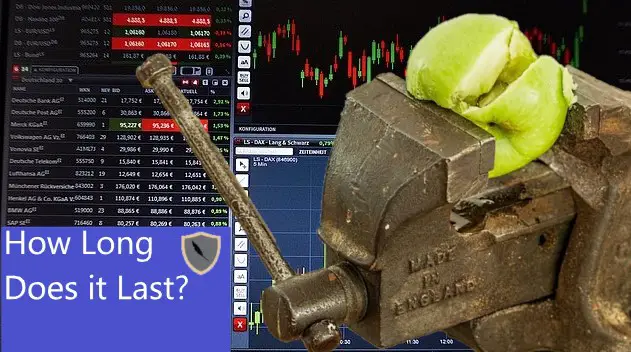Investing in the stock market is a skill, a skill you can either learn on your own or at a college/university. However it is often hard for young adults to pick the right degree path to end up in the lucrative field of stock investing.
The top 5 degrees to enter into the world of professional investing are; Finance, Business, Marketing, Computer Science, and History (GIS).
Picking the right degree can give you a massive lead on other candidates entering the workforce at the same time as you. Further, the average salaries for the above degrees are astounding if paired with the right internship/experience.
It is not uncommon to see salaries in the range of $130,000-$190,000 for new hire’s at some of the most notable funds in the U.S. Having a good degree is going to make you stand out from the crowd and give you the best opportunity to start a career as a professional stock investor.
Here at ChronoHistoria I am a professional investor gone rogue, I work for myself now instead of at funds. I constantly publish stock research articles and tips/tricks of the trade for both amateur and professional traders alike. There is a free newsletter if you feel like remaining up to date on all the new information.
Without further ado, let’s jump right into the Top 5 Degrees for Investing in Stocks Ranked by Potential Salaries.
Where the Data for these Degrees Comes from
For each degree I get data from hiring managers at funds that I personally know and from Glassdoor.com.
Most job descriptions at investment banks and hedge funds don’t match up exactly to the degree. Further, depending on the funds/IB’s needs they might change the total job description from one year to another.
As such I have averaged out each of the following degrees into what they would be targeting as employment opportunities in the field.
Degree 1: Finance
Potential Starting Salaries:
| Investment Banks (U.S) | $75,000-$90,000 |
| Hedge Funds (U.S) | $85,000-$145,000 |
| Competition Level | High |
It goes without saying a degree in finance will set you apart from the thousands of candidates that hedge funds and investment banks get every day.
Its not the best degree on the list for two reasons; First, everyone gets a finance degree and applies to the world of IB and HF’s. As such you are going to be lumped into the same category as thousands of other candidates.
However, finance is a very fluid degree. You should have an internship or two in the world of investing before applying to one of the larger investment banks or funds. Some of the best places to get these internships are smaller wealth management funds.
An internship in the field of wealth management is going to be boring. You will spend your days pricing bonds or building never ending DCF’s. It’s not my cup of tea, but having two years of work experience will set you apart from other candidates.
Degree 2: Business
Potential Starting Salaries:
| Investment Banks (U.S) | $75,000-$85,000 |
| Hedge Funds (U.S) | $100,000-$150,000 |
| Competition | High |
A business degree is easier to use to get into the world of high finance, only if it comes from a good institution with connections. This is because a business degree teaches good valuation practices and entirely matters on networking capability.
If you want to go this route you should enroll in the Chartered Financial Analyst program during the last year of your degree. This will allow you to attend the CFA events and network with private family funds/professional investors who will see your business skill set. (Click here for the CFA)
Getting into Investment Banking with a good business degree is a bit easier from a non-target school than finance. However it is still extremely competitive and you will have to network to land an interview. However your competition is a bit less than finance degree holders.
An amazing place to obtain experience in the form of internships is the world of private equity. PE is always looking for new talent to help manage their portfolio of businesses. You will have to attend the CFA networking events to have access to these opportunities or get lucky with a random application.
Degree 3: Marketing
Potential Starting Salaries:
| Investment Banks (U.S) | $55,000-$100,000 |
| Hedge Funds (U.S) | $135,000-$165,000 |
| Competition | Normal |
Marketing? Yes, that’s right marketing.
The salaries at Investment Banks might be a bit lower than Finance and Business but your real meal ticket is in the world of Hedge Funds.
This is because new hires with a marketing degree and internship experience in the world of high finance have the capability to fundraise for funds. Fundraising and client relations for hedge funds is a huge way to make money as an aspiring career professional investor.
It is not uncommon for new hires fresh out of their university to make between $150,000-$250,000 in their first year if they can fundraise for a hedge fund. This is because one of the hardest things for hedge funds is to grow or keep clients. If you can ‘interface’ with a client or potential client successfully and pull capital to your fund you will get a portion of the AUM as a bonus.
It is because of this that marketing degrees earn a ton at hedge funds. Investment banks are a bit lower because they often have hundreds of people going after a few clients. You don’t have to graduate from a target school, but you will have to have internship experience to land a good position.
Entering into the world of high finance with a marketing degree and internship experience is a bit easier than business and finance. However it is still hard and will take about a year of solid dedication to networking.
Again I recommend the CFA program for networking capabilities. You will meet amazing people and have job opportunities open up to you. (CFA source)
Degree 4: Computer Science
Potential Starting Salaries:
| Investment Banks (U.S) | $135,000-$175,000 |
| Hedge Funds (U.S) | $165,000-$215,000 |
| Competition | Low |
Now we are getting into the fun part of investing.
If you graduate with a computer science degree and have work experience/projects that revolve around algorithmic development in the stock market you will be making $130,000-$175,000.
Further, the competition is low and you don’t need to network to obtain a good job. Finally to add the cherry on top, funds and investment banks every year have more jobs than applicants. This means that landing a job at your dream company is easier than ever before with a computer science degree.
For investment banks you will have to build automated financial models. The goal here is to autoprice companies based on their financial reports. Further, you might be front end and be building programs the clients can easily interface with.
This is the only career on the list where you don’t actually need a degree to get into the field. You can attend one of the many ‘boot camps’ or ‘online micro-degree’ courses to get a leg up on the competition or pivot into the field. Having a computer science degree will only further increase your earning potential.
For these micro-degrees the funds I have working with highly respect the following programs.
- Udacity (https://www.udacity.com/)
- Udemy (https://www.udemy.com/)
The world of the ‘quant’ is new and rapidly expanding. If you are looking for an extremely high paying job then I suggest you look into getting a degree in computer science.
Degree 5: History (GIS/Data Science)
Potential Starting Salaries:
| Investment Banks | $45,000-$140,000 |
| Hedge Funds | $185,000-Unknown |
| Competition | Normal |
History….Really? Yes, but with a GIS specialty and experience in computer programming. A normal history degree won’t get you in the field.
GIS stands for Geographic/Geospatial Information Systems. GIS allows researchers to overlay computer programming on interactive maps to track large data sets to generate higher than normal market returns (Alpha). Further, because of the necessary computer programming knowledge and logic building experience GIS researchers/historians pivot their experience into Data Science.
For example here is a data map from Adams County, Colorado demonstrating the most influential ongoing business development locations over the next 4 years. (Source)
Historians with a GIS specialty are capable of programming in human factors such as consumer buying patterns, migratory data, financial spending habits, and a slew of other data. Further, this data can be organized chronologically to determine where to allocate a potential investment to maximize potential return.
Essentially historians with a GIS specialty combine a computer science degree with data visualization technology to generate higher than normal market returns. Because of this they fall into the category of Quant/Data Scientist. This is still an emerging field in the world of high finance but the growth rate of GIS developers is expected to skyrocket over the next decade.
Just like the computer science degree historians (GIS) make high bonuses based on how well their target research performs in the market. It’s not uncommon to see a data scientist at a larger fund have a yearly return in the range of $250,000 or above. It really depends on the end of year bonus.
Some researchers can even generate well above a million per year but those are outliers. Generally you can expect to return around $170,000-$200,000 a year at hedge funds. At investment banks researchers with a history degree and GIS certifications earn significantly less because of lack of demand for the investment strategies.
As the age old saying goes “those who do not know history are doomed to repeat it.” If something is repeatable, we can make money by investing in its probability.
Honorable Mention: Economics
Economics bachelor’s degrees can enter into the world of high finance but it is extremely hard. This is because oftentimes economics has to be either a minor or a dual degree where the theory can be put into practice.
A great degree route for those who are interested in economics is to pair it with computer science. That will allow you to position an investment methodology to be back tested to see its feasibility.
If you can get into an economics degree at a top tier institution then you might be able to walk straight into a career at a hedge fund but it’s incredibly hard.
Also oftentimes an economics major will have to obtain graduate level education to break into the field. This is because the overall field of economics in the world of high finance is theory based. Funds and IB’s want to see a graduate degree. If you get one however you will make a lot, in the range of $200,000.
Conclusion
There you have it, the top 5 degrees for investing in stocks ranked by potential salaries. Some of the degrees are to be expected but others most people wouldn’t guess.
Breaking into the field is hard for any degree is hard outside computer science. This is because at the end of the day both investment banks and hedge funds have the clients overall financial health as their number one goal. Potential employers want to make sure that their clients are going to be well taken care of when hiring potential employees.
If you can assure them that you are the real deal and that you want to enter the field then go for it. I am sure you will enjoy a career in high finance.
As usual if you like content like this then feel free to subscribe to the free newsletter to remain up to date on stock research and tips/tricks of the trade. I will never spam you and you can unsubscribe whenever you want.
Further, below is some of my most recent articles.
-
How Long Does a Short Squeeze Last? (3 Answers)

What is the time frame for you short squeeze? Well here is everything you will ever need to know to determine how long it will last.
-
Why You Still Own a Stock After It’s Delisted and How to Sell It

Do you still own a stock after its delisted? How do you sell it? Don’t worry the stock is still worth money and here is how to sell.
-
Can You Make 1% A Day in the Stock Market? (3 Steps)

Making 1% a day in the stock market is hard but defiantly doable. Here are 3 simple steps to helping you achieve this return.
Until we meet again, I wish you the best of luck in your investing journey.
Sincerely,



